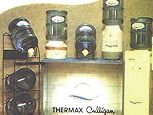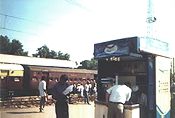Thermax offers quality with Culligan water systems
By Usha Somayaji | 27 Sep 1999
 "We offer, not just water, but a glass of trust," says R A Venkitachalam, chief executive officer, Thermax Culligan Water Technologies Ltd.
"We offer, not just water, but a glass of trust," says R A Venkitachalam, chief executive officer, Thermax Culligan Water Technologies Ltd.
The reference is to the water offered from their water vending machines, Good Water Stop, the latest offering from the Good Water People, which will soon dot heavy-traffic thoroughfares, railway stations, bus stands, hospitals, mangal karyalays, airports.
The Good Water Stops cater to the safe water needs of people in transit, making Thermax Culligan a "complete water solutions" company offering safe water solutions for people in their homes, at their workplaces, and during transit.
For the household sector, Thermax Culligan has ozonisers, water conditioning systems (for large buildings and housing complexes), softeners and purifiers. For people at work, Thermax Culligan began supplying purified water in 20-litre bubble jars since last year, from its state-of-the-art seven-stage  water purification plant at Taloja in New Bombay. The water is delivered by the company's own personnel to ensure timely delivery of the genuine stuff.
water purification plant at Taloja in New Bombay. The water is delivered by the company's own personnel to ensure timely delivery of the genuine stuff.
Confluence of strengths
Thermax Culligan is a 50:50 joint venture between Thermax Ltd., the Indian energy and environment engineering major and Culligan, USA, a wholly owned subsidiary of the $1 bn US Filters Corp., the world's largest water treatment company.
While Thermax has been in the industrial water treatment business for the past 20 years, this new venture is an outcome of Thermax's plans to enter the consumer product business. "Water offered the most promising opportunity," says Mr Venkitachalam.
Industrial products continue to be an important part of Thermax Culligan activity, accounting for over 75 per cent of its turnover. These include demineralisation plants, softeners, reverse osmosis systems, filters and colour removal systems. During fiscal 1998-99, of the Rs 25 crore turnover, industrial products accounted for Rs 18 crore, which is expected to rise to Rs 20 crore during the current year. Total turnover is expected to cross Rs 32 crore.
Its household and commercial products range is set to see some action. These include point-of-entry and point-of-use water solutions - purifiers, reverse osmosis plants, and the latest offering, the water vending machines. Household and commercial products accounted for Rs 4 crore the last fiscal, and are expected to rise to Rs 7 crores this year.
In the bottled water sector, the action has already begun. With its plant at Taloja becoming operational in April 1998, the company is already making inroads in its target markets. Within a year, it has taken lead position in the 20-litre bottled water segment, carving out a 30 per cent market share. Its targeted Rs 5 crore turnover this year, compared with Rs 3 crore last year, seems easily manageable.
Promise of quality
Its personalised delivery service, through its own personnel, though more expensive in the short term, may yet prove to be its ace card, giving it an edge in terms of credibility and reliability. "Our promise is to deliver on time, every time," says Mr Venkitachalam. This mode of delivery will also serve to keep the company's ear close to the ground, and give it valuable consumer feedback.
"Bottled water is the fastest growing segment, growing at the rate of 10 per cent every month, even during the off-season," says Mr Venkitachalam. With over 3,000 clients under its belt, from Mumbai and Pune alone -- airline offices, TV companies, banks, post production houses, film studios, software outfits and financial institutions, the discerning white collar worker is the mainstay of this segment.
With this segment set to grow exponentially, thanks to the IT boom, the bottled water business has it going good. At Rs 60 a 20 litre bottle, it works to Rs 3 a litre which is a small price to pay for a lot of assurance on water quality (and thereby the health of the high-paid worker).
By March 2000, bottled water production is expected to rise to 70,000 bottles per day (from current levels of 30,000 bottles), and distribution is to be extended to smaller towns like Lonavla, Nashik, Aurangabad, Ahmednagar, Mahabaleshwar.
A couple of new bottled water plants are also planned, although the location - Chennai or Bangalore or Hyderabad - is yet to be decided.
 Expanding reach
Expanding reach
Now, with the water vending machines, the company reaches out to the man on the street as well, the busy commuter who has need for safe drinking water, but cannot pay Rs 10 to Rs 13 a litre, which is the price of a standard "mineral water" bottle. "Therefore, there was need for some other solution," says Mr Venkitachalam. Which was the niche for the water vending machines.
"The Railways alone carry 1.5 crore passengers a day. An estimated 30 to 40 million commuters are on the move everyday," Mr Venkitachalam comments, suggesting the growth potential of the market. "The market is not a limiting factor. Our growth will depend on our ability to put up the infrastructure and provide the service."
The water vending machines, which carry out a four-stage purification process on the spot (activated carbon filtration, primary and secondary ozonisation, ultra violet sterilisation), have the capacity to vend out purified and cooled drinking water at the rate of 300 cups of 300 ml or 100 bottles of one litre of water per hour. The litre bottles are priced at Rs 6 a bottle, and 300 ml glasses at Rs 2 a glass, and refills can be had at Rs 3 a litre.
The vending machines were first test marketed at the Pune railway station last year, with encouraging results. In October 1998, a vending machine was put up at the Delhi station, and the response was so good that the Railway Board, for the first time, took a decision to float a tender for water vending machines. The company is now all set to put up 32 such water vending machines at various spots in the country, eight of which will be at railway stations, including New Delhi, Old Delhi and Nizamuddin, and the western parts of the country, including Mumbai and Pune. With an estimated revenue generation of Rs 1,000 per train, the picture sure looks cozy.


















